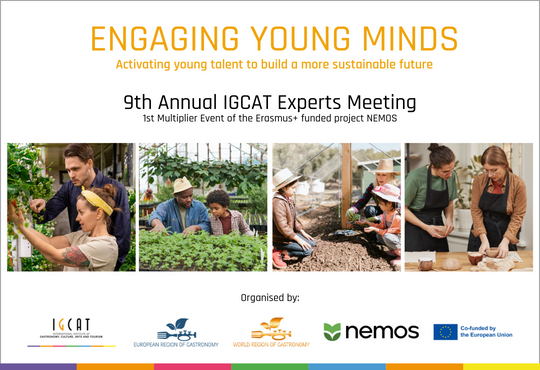IGCAT experts and stakeholders in food, education, culture, agriculture, arts, hospitality, tourism and many other sectors from the World and European Regions of Gastronomy took part in the Engaging Young Minds webinar, held on 20 October 2022 and attended by over 150 participants from 35 countries across the globe.
Organised by IGCAT, the event highlighted good practices and pioneering projects involving the young people in the awarded World/European Regions of Gastronomy and beyond, inviting cross-sectoral perspectives on how to engage and activate young talent in the quest to build a more sustainable future.
«Education and awareness building on the importance of cultural and food diversity is more urgent than ever and therefore this meeting is about finding out how we can do more», expressed President of IGCAT, Diane Dodd PhD, when she opened the webinar with a focus on how the World/European Region of Gastronomy Platform is empowering and engaging younger generations.
Dr. Maria J. Cantalejo from the Public University of Navarra presented the Erasmus+ co-funded project NEMOS – A new educational model for acquisition of sustainability competences through service learning and demonstrated clearly that both educators and students want more focus and support on sustainability in education.
Social Integration and Food Diversity; Building Pride in Food Heritage; Integrating Sustainability Competences In Education; Building Criteria for Food Sustainability; Empowering Young Minds; Preserving Bees and pollinators; Food for the Future were topics of the breakout sessions and group discussions with expertise from global experts and young entrepreneurs and students.
Each of the sessions aimed at providing recommendations on how IGCAT and the World/European Regions of Gastronomy Platform can push the education agenda further and generate better opportunities for young people through sustainable and creative initiatives.
“We are building a movement for a better future and this wouldn’t be possible without all the amazing projects that are taking place on the ground in the Regions of Gastronomy,” stated Diane Dodd when praising all the initiatives that were presented during the webinar.
Organised as the 9th Annual IGCAT Expert Meeting and 1st Multiplier Event of the NEMOS project, the Engaging Young Minds webinar was also the occasion to announce the winners of the International Food Film Menu 2022 Public Vote.
See the Engaging Young Minds webinar full programme and contributors.
About IGCAT
IGCAT aims to empower local communities by raising awareness of the importance to protect and promote distinct regional food, culture, arts and natural assets as part of sustainable and balanced tourism and development strategies. This is essential to safeguard our planet, health, wellness and local economies.
IGCAT is a non-profit institute established in 2012, working with regional stakeholder consortiums in the fields of gastronomy, culture, arts and tourism. It counts on the expertise of a worldwide network of experts and works in partnership with specialised intergovernmental organisations.
IGCAT founded the European and World Region of Gastronomy Award and is the official secretariat for the World and European Regions of Gastronomy Platforms. Furthermore, the Institute has developed the European Young Chef Award, the World Food Gift Challenge, the Top Websites for Foodie Travelers Award and the Food Film Menu.
About the NEMOS project
The NEMOS project acknowledges sustainability as an increasingly crucial skill for graduate and post-graduate students to tackle important global challenges such as climate change, food waste and the loss of biodiversity in their professional future. Therefore, the project aims to define a new educational model to integrate sustainability competences in the curricula of food-related degrees by means of service learning.
Co-funded by the Erasmus+ programme of the European Union, the NEMOS project is led by the Public University of Navarra and includes the following consortium partners: Technological University Dublin (Ireland); Technological University Graz (Austria); Rhône-Alpes Higher Institute of Agriculture (France); University of Pisa (Italy); and IGCAT.
21 octubre 2022
